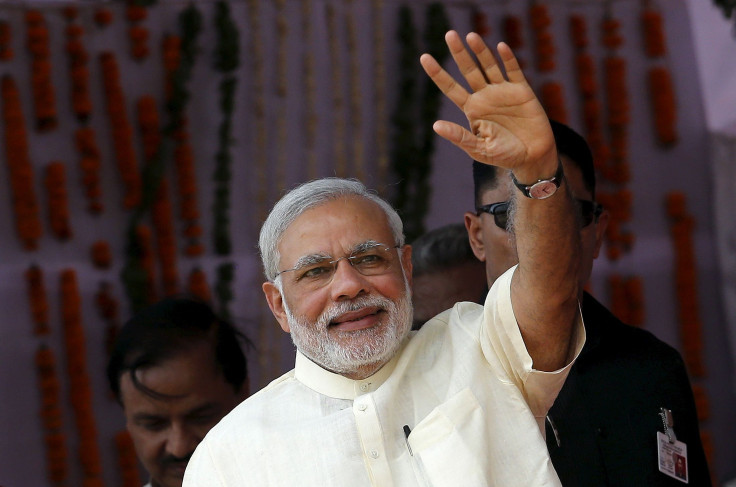Narendra Modi's First Year: 'Policy-Driven' Administration Or 'Anti-Poor' Government?

Indian Prime Minister Narendra Modi, marking the completion of his first year in office, lauded his administration’s “policy-driven proactive governance” in an open letter published Tuesday. However, popular opinion about Modi’s administration seems to be divided between praise for his efforts in reducing red tape in the country's notorious bureaucracy and boosting foreign investment, and accusations against his “suit-boot” government being anti-poor.
“We assumed office at a time when confidence in the India story was waning. Unabated corruption and indecisiveness had paralyzed the government. People had been left helpless against ever climbing inflation and economic insecurity,” Modi wrote, in a letter published on a website listing out the Bharatiya Janata Party-led government’s achievements. “We systematically went about addressing these challenges. Runaway prices were immediately brought under control. The languishing economy was rejuvenated, building on stable, policy-driven proactive governance.”
According to an opinion poll by Mint, an Indian newspaper, which surveyed 12,481 people, Modi still has an approval rating of almost 74 percent. However, the survey shows a significant gap in the approval ratings in metropolitan cities -- 82 percent -- over non metros -- 67 percent.
Most indicators suggest that India’s economy has had a good year, so far. Given that the country is heavily reliant on imported oil, a drop in global oil prices have helped the government cut the cost of fuel subsidies. This, in turn, has allowed the government to rein in its budget deficit.
“Government betters its own financial targets during 2014-15; fiscal deficit for the financial year stands at 4.0 percent (of GDP) against the target of 4.1 percent,” India’s finance ministry said, in a statement released earlier this month.
Wholesale price inflation fell to its lowest level in nine years, contracting for the fifth straight month in March, while retail inflation fell to 4.87 percent in April. Between April 2014 and February 2015, foreign direct investment in the country rose 39 percent, as compared to the same period last year, according to figures released by the government.
The last year has been characterised by full transparency, quick reforms & strengthening of our Federal Structure. http://t.co/2EqA2rKwvA
— Narendra Modi (@narendramodi) May 26, 2015The government has “taken steps to create the environment for investment, which I think is important,” Raghuram Rajan, the governor of the Reserve Bank of India, reportedly said last week. And, sentiment has soared in India's financial markets as measured by the benchmark BSE Sensex stock index, which has soared nearly 12 percent since Modi took office.
However, while figures show the economy expanding at 7.4 percent in the year ended in March -- after clocking its slowest growth in a decade in 2012-2013 -- analysts say that the result was inflated by recent revisions in the way the country’s GDP is calculated. Critics have also accused the Modi government of indulging in “hyperbole” and failing to have a long-term economic policy.
“Government is talking big on economic matters but nothing is happening on ground. Delivery is missing,” Arun Shourie, an economist and politician, reportedly said. His sentiments were echoed by Deepak Parekh, chairman of HDFC Bank -- one of India's largest private banks -- who alleged that under the Modi government, procedures for obtaining funds were taking more time than in earlier years.
“After nine months, there is a little bit of impatience creeping in as to why no changes are happening and why this is taking so long having effect on the ground,” Parekh said, in an interview with the Press Trust of India.
In addition, some of the government’s policies, especially the controversial land acquisition bill, have been labeled “anti-poor” and “anti-farmer” by those in the opposition.
“I'll tell you how [Modi] won the election. He took loans of thousands of crores [1 crore = 10 million] from big industrialists from which his marketing was done. How will he pay back that loan now? He will do it by giving your land to those top industrialists. He wants to weaken the farmers, then snatch their land and give it to his industrialist friends,” Rahul Gandhi, vice president of India’s Congress party, said, in April.
Trying to dispel these concerns in his open letter, Modi reasserted his government’s commitment toward the “the poor, marginalized and those left behind.”
“Numerous measures and schemes have been initiated … from ensuring a minimum pension to our labourers to providing social security to the common man; from enhancing support to our farmers hit by natural calamities to defending their interests at WTO,” Modi wrote, in the letter.
And as critics point to the perceived lack of tangible actions on the part of Modi's administration, optimists choose to express hope that Modi will deliver on his campaign trail promises in the coming years.
© Copyright IBTimes 2024. All rights reserved.












